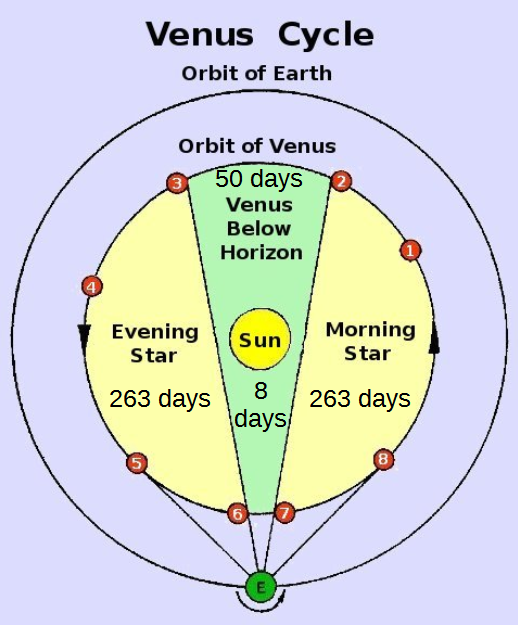CrossRoadsPedestrian said:
Time as it is commonly measured with seconds, minutes, hours, days, weeks, months, and years is probably a concept created by the enemy. I vaguely remember reading about this and I'm paraphrasing but it basically stated that the general measurement of time is just based on the movement of the earth, the moon, sun, and the planets
On an analog clock:
Second hand represents Mercury
Minute hand represents the Moon
Hour hand represents Horus/The Sun
Days are measured by how long it takes the earth to rotate upon its on own axis 360 degrees.
Weeks
Monday - Moon
Tuesday - Mars
Wednesday - Mercury
Thursday - Jupiter
Friday - Venus
Saturday - Saturn
Sunday - Sun
Look at the prefixes of the days of the week in the French language it will be easier to see
And then for a year
Summer Solstice
Autumn Equinox
Winter Solstice
Spring Equinox
all having to do with the zodiac signs
Time does have a practical usage though. A few examples: Keeping habits, planning events or meet-ups with other people... Shorter units of time are also useful for measuring things like efficiency of production also for measuring physical fitness to a degree.
I agree that the fast paced manner of it can be a trap and put people in a time crunch
The question is though, why do we use the units and specific numbers of measurement that we use?
As for the numbers aspect of time, such as 60 seconds being a minute, 60 minutes being an hour, 24 hours being a day, 7 days being a week, 54 weeks being a year, etc.....I don't know why these numbers were chosen. Can anyone explain?
I bet ancient civilizations could "tell what time of the day it was" just by looking at the angle and strength of the sun and/or the moon in the sky
I love this question and it's one I'm happy to share what little I know so far.
Also, that is some mind-blowing information! Astrology is so fascinating and I seriously need to research it more.
We measure seconds and minutes using the decimal system.
This is how we divide the span of time of hours, days, months and years.
The ancient Babylonians measured 1 year as 354 days with 12 months, and the Sumerians measured 1 year as 360 days with 12 months. This part is confusing to me but I found this interesting article that explains it better than I ever could: https://www.livingwiththemoon.com/origins-of-the-calendar/
Julius Caesar first implemented the leap year in 54 BC(E). The Romans at the time had a 355 day calendar and with the Julian calendar changed it to 354.2425 day and added 1 day every 4 years. This is the calendar that we currently use today.
In terms of weeks, the Babylonians created them after the 7 planets. Here's an interesting excerpt I found from Encyclopedia Britannica:
"The week’s origin is generally associated with the ancient Jews and the biblical account of the Creation, according to which God laboured for six days and rested on the seventh. Evidence indicates, however, that the Jews may have borrowed the idea of the week from Mesopotamia, for the Sumerians and the Babylonians divided the year into weeks of seven days each, one of which they designated a day of recreation".
It's believed that it was first derived from the ancient Babylonians' sexagesimal (base 12) system.
In this system, they counted their finger-joints (12 on each hand) as a means of calculation and measurement.
Later the Egyptians adopted this measurement system. I find this very interesting also because Maxine talks about Satan being worshipped by Babylonians and Egyptians.
Other methods (particularly found in Hindu regions) used a "5" and "10" counting system by using all fingers and thumbs.
Theories suggest that the combining of these two systems is what gave rise to the number 60 in measuring time, which then spread to Europe and become the world standard.
There are 1-thousand milliseconds in a second and 1-billion nanoseconds in a second. This is what time is in modern physics, duration measured by the observer using the decimal system.
Yet in Newtons physics, Einstein's theory of relativity and in quantum physics time is variable. In the universe only changes exist and this has no duration.
You could think of it as everything being current. The universe has no past or future, only present.
This means that time is not a real tangible thing but rather it's an idea constructed by man from watching things in motion (planets, etc).
So we have this variation of time (duration measured by the observer) yet there's one other kind recognized by scholars: psychological time.
This time can be fast or slow, such as how certain memories may occur at varying speeds.
I would even argue that music is this way at times, fluid and uncoordinated.
As we know, daylight and nightfall always have varying lengths (except on equinoxes).
Ancient people used sundials to measure hours of daylight and moonlight in increments in which hours varied in speed depending on the position of the sun.
They did this by placing bowls of water with marks on their rims and would observe the sun or moon moving along the marks. Hours would generally be the same length yet always changing.
Today we measure morning (12 AM to 11:59 AM), afternoon (12:00 PM to 5:59 PM), evening (5:00 PM to 7:59 PM) and night (8:00 PM to 11:59 PM).
To the ancients they considered morning the time the sun rose and night when it fell. It's the same with all natural life, plants and animals alike.
Also, in spiritual practices night and morning are not measured by using time.
This I suppose is why I don't like it. That and the fact that Catholics and Jews adopted and changed the ancient Mesopotamian systems.
In the end my personal opinion is that modern (decimal) time is a way to enslave people. I could always feel something very wrong when I watched seconds counting on a clock.
You perhaps know this feeling... watching the seconds on a clock at school or at work in a meditative state. Perhaps I'm crazy but I'd rather that than anything else.
Satan is the only thing that's given me peace and true deeper meaning in life. TBH I had chronic bouts of depression before truly connecting with him.
He allowed me to accept that nearly everything isn't perfect and that I need to love myself with my imperfections and seek not to obsess over the world's problems. He also showed me that perfectionism is not an expectation in Satanism but rather it's a goal that we do our best to work towards. We will have ups and downs but its the long-term journey and how we develop, understand and empower ourselves is what matters the most.
Anyway, there I go rambling again. :lol:
These were more recent revelations for me and I think I've been adding them to just about every message lately. It's good to end these things on a positive note. The most important thing I think is that we focus on living in the here-and-now rather than stressing about the past and future. This is how we enter into flow-state; meditation and focus.
Hail Satan!!!
! I love the greek perception of him also
especially as a welder! https://www.youtube.com/watch?v=ERTQucdIp-s


 That is an amazing video! I love the learics!
That is an amazing video! I love the learics!  And the positive message behind it!
And the positive message behind it!  That made my whole week!
That made my whole week!








